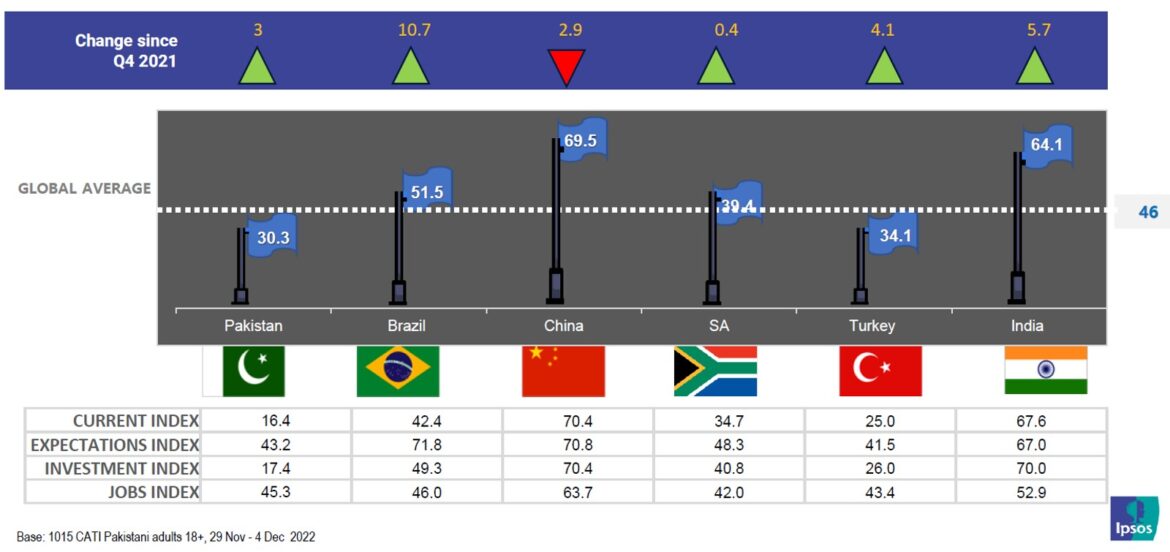Although continued political stability continues to take its toll in terms of perception, a dogged optimism about the country’s economy is returning.
By Ahmer Kureishi
ISLAMABAD: In a clear indication that the government of Prime Minister Shehbaz Sharif needs to do more to convince the masses that it is in control, only about 1 in 4 Pakistanis hope their economic situation to improve over the next six months.
This is one of the many findings of a consumer confidence survey of Pakistan conducted by Ipsos Group over the quarter Oct-Dec 2022 that says Pakistan’s score on the consumer confidence index has climbed by 3 percent to reach 30.3 percent.
Headquartered at Paris, France, the multinational market research and consulting firm routinely conducts this kind of research in several countries across the world including Pakistan.
Pakistan’s score on the index is comparable with Turkey’s 34.1 and South Africa’s 39.4 percent, but lagging behind Brazil’s 51.5 percent, India’s 64.1 percent, and China’s 69.5 percent.
The only upside of the survey is that the thick pall of economic gloom that has enveloped Pakistan for the last few years is lifting ever so slightly.
More people in Pakistan now see the country’s economy and their own financial situation as strong than did in than the previous quarter.
Highlights of the study published by Ipsos show that for the first time since current government took charge, although the gains are minute.
Only 1 in 6 foresee the economy getting stronger, with middle-aged, rural males showing more optimism than other groups.
The trend of Pakistanis stating their own financial situation as ‘weak’ is also ebbing, although still only 5 percent call it strong.
It bears emphasising that the Ipsos study and index measure perceptions rather than reality. This is a nod to how the markets rely on perceptions and sentiment as well as on the fundamentals of economy.
For instance, in the election year 2018, 74 percent Pakistanis thought the country was heading in the right direction. In reality, Pakistan’s economy was about to enter the worst year in the country’s history – reporting a contraction the very next fiscal.
The study brings out that inflation, unemployment, and rising poverty continue to remain the major concerns of the majority of the public, although inflation has edged up on the table to surpass unemployment as the leading worry of Pakistanis.
Inflation and unemployment have always been biggest concerns for Pakistanis in the last decade, although inflation was less of a worry before 2019.
Concern about flood damage, which shot up on the index last quarter, had almost dissipated by the end of this quarter.
This mirrors how the masses have been lulled into a false sense of security by the government’s misplaced complacence about a disaster although it will take years to rehabilitate those at the receiving end of its impact.
The trend of Pakistanis considering country’s current state of economy as ‘weak’ seems on the wane, although only 5 percent call it strong.
Nearly 1 in 4 expect their financial situation to be getting better in next 6 months, while more than half (55 percent) think their financial situation to be even weaker in coming 6 months.
Pakistanis’ confidence regarding job security remains extremely low with 9 in 10 less confident about it as compared to one year ago
Pakistanis’ confidence about their ability to invest in future has slightly slipped further. Similarly, 95 percent are less confident to make a major purchase.
Copyright © 2021 Independent Pakistan | All rights reserved




